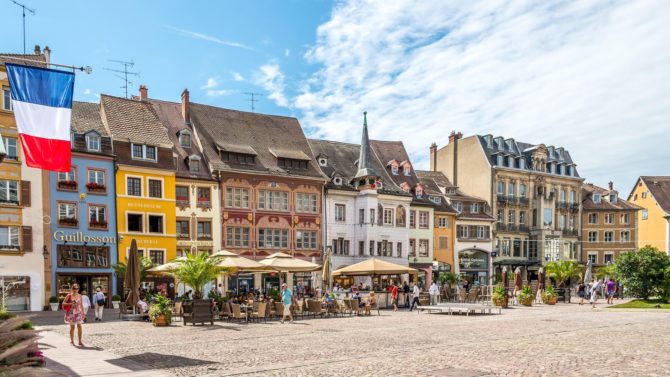Can you guess which 3 French towns are the best to live in?


Which town in France would you pick as the best to move to? Perhaps a British favourite like Bergerac in Dordogne, or a picture-postcard town like Annecy in the French Alps? Maybe the capital itself, Paris, the French Riviera capital Nice, or perhaps the capital of gastronomy Lyon?
In fact, those cities came at the bottom of a new ranking, and the top three may come as a surprise. The past couple of years have had a huge impact on the way we live our lives. Big cities have lost some of their appeal as the Covid-19 pandemic led to a desire for green space and bigger homes with gardens rather than cramped inner-city accommodation.
Rural France isn’t for everyone though, and more recently medium-sized towns have come into their own. Towns with amenities, job opportunities, affordable property and plenty to do, on a more human-scale than the big cities, and with countryside on the doorstep. And that certainly sums up the three towns that came out on top of a ranking by French financial services marketplace Meilleur Taux and job search site Meteojob.
The ranking was based on housing and employment opportunities, using the percentage of the working age population with permanent work contracts (CDI) and the square metre housing that could be purchased on the median salary for the area.
The results saw the north of France come out on top, with the Mediterranean basin, while desirable, not offering a good balance of affordable homes and job openings.
1) Mulhouse
Where, you might ask, and indeed this town in southern Alsace flies under the radar for most British househunters and holidaymakers. The French, however, have come to appreciate this town of 108,942 inhabitants for its dynamic economy. It’s also known for having the largest car and railway museums in the world.

Near the borders with Switzerland and Germany, Mulhouse is at the heart of Europe. Now a subprefecture of the Haut-Rhin department, in the Grand Est region, it was an independent territory until 1798. The historic centre has typical Alsacien architecture, with colourful facades. The Place de la Réunion is the place to meet friends in the restaurants and bars (don’t miss the Christmas market in winter) while shoppers flock to the pedestrianised Rue du Sauvage and market hall. You can enjoy concerts and exhibitions at the St-Etienne Temple, or stroll in the Zoological and Botanical Garden. The city also has a university.
For excursions out of the city, there are the vineyards and Alsace Wine Route along with famously pretty towns and villages like Colmar. The regional capital Strasbourg is also close by.
In the ranking, the city showed 6.29% of permanent CDI job offers per 100 inhabitants, and property purchasing power at 83m2 (for the average salary). The average property price was €1,795/m2.
2) Orléans

Over in western France, on the River Loire, Orléans is at the heart of the Loire Valley, a Unesco World Heritage site. A prefecture of the Loiret department in the Centre-Val-de-Loire region, the city of 116,238 residents has a rich history. It was the capital of the Kingdom of France during the Merovingian period and played an important role in the Hundred Years’ War, in particular when Joan of Arc liberated the town during the siege of Orléans in 1429 – there’s a museum paying tribute to her, of course.
Orléans is an attractive university town with many historic buildings including the Gothic cathedral, a pedestrianised area with artisan shops, and redeveloped river banks with summer music festivals. Today a big appeal is its easy access to Paris (about 120km north-west and under two hours by train) and it has therefore become popular with those moving away from the capital but not wanting to be too far away.
The city ranked highest for job security with 7.22% of permanent contracts per 100 inhabitants, along with a property purchasing power of 69m2. The average property price was €2,601/m2.
3) Dijon

The Burgundy capital and home to the famous mustard (as well as kir royales) has an attractive city centre, entirely pedestrianised, with elegant buildings, numerous museums, an opera house, 9,500-capacity arena and university.
There has been a settlement here since Neolithic times, in Roman times it was known as Divio, and from the 11th to 15th centuries Dijon was the seat of the wealthy Dukes of Burgundy. Many architectural styles have survived from the Capetian, Gothic and Renaissance periods, and the distinctive colourful patterned rooftiles are a particular marvel. The historic centre is a Unesco World Heritage site. The city has 156,854 residents.
The prefecture of the Côte d’Or department, Dijon is surrounded by the famous Burgundy vineyards and the city is known for is gastronomy and fine wines. It holds an International and Gastronomic Fair every year, with over 500 exhibitors and 200,000 visitors.
The city showed 6.47% of permanent job contracts per 100 inhabitants (almost 12 times higher than the 2020 rate of 0.54%) and a property purchasing power of 57m2, with an average property price of €1,795/m2.
Runners-up

Other towns that stood out in the rankings include Rouen, St-Etienne, Le Mans, Limoges, Tours, Metz and Besancon (at numbers 4-10). Notably, along with the top three towns, all these (except St-Etienne) are in the northern half of the country.
Bottoms up

At the other end of the ranking are three cities that have always been seen as very desirable – and as a result are home to some of France’s most expensive properties: Paris (31), Nice (30) and Montpellier (29). They share the low end of the rankings with two other Mediterranean hubs Marseille (28) and Toulon (27), along with southern city Lyon (26).
In terms of job opportunities, Paris provided just 4.34% permanent CDI job contracts per 100 inhabitants, along with a purchasing power of just 17m2! The average property price was €11,377/m2.
Share to: Facebook Twitter LinkedIn Email
More in French news and current affairs, Living in France, Working in France


